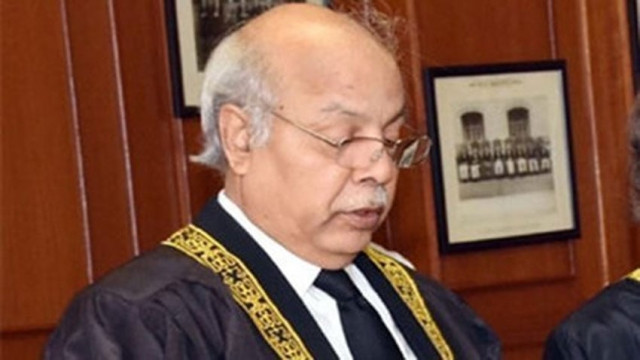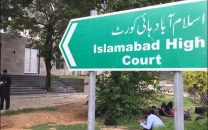Corruption, maladministration appear to be high on new CJP’s priority list
Judicial activism is likely to resurface during Justice Gulzar's tenure

PHOTO: RADIO PAKISTAN
Justice Gulzar was appointed as a Sindh High Court (SHC) judge on Aug 27, 2002 and served there before his elevation to the apex court on Nov 16, 2011. He had refused to take a fresh oath as SHC judge under the Provisional Constitution Order (PCO) on Nov 3, 2007.
Justice Gulzar was part of a seven-member bench which had convicted then prime minister Yousuf Raza Gilani in a contempt case for not implementing the apex court’s Dec 16, 2010 judgment on the National Reconciliation Ordinance. He was also part of a larger bench which had disqualified then prime minister Nawaz Sharif in the Panama Leaks case.
Soon after his elevation as CJP, Iftikhar Muhammad Chaudhry had hand-picked him to sit on his bench which had been overwhelmed by public-interest litigations. Justice Gulzar was also part of a number of high-profile proceedings during Iftikhar’s tenure. He is known for his honesty, integrity and boldness among members of superior bars.
Justice Gulzar doesn’t compromise on the integrity of court. He headed the bench which had disqualified PML-N MNA Talal Chaudhry in a contempt case. Similarly, he was the author of the judgment in the ex-CJP Iftikhar manhandling case in which police officers had been jailed.
Justice Gulzar has given different departments of the Sindh government a tough time over maladministration, especially on issues of land encroachment and poor public transport in Karachi.
He has also banned the use of unregistered motorcycle-rickshaws, better known as Qingqi rickshaws, across the country. According to a senior lawyer, Sindh government officials are scared that Justice Gulzar will give them a tough time over maladministration in the province.
CJP says time to rethink strategy to curb militancy, terrorism
Challenges
At a time when Justice Gulzar is taking oath as CJP, the superior judiciary is facing serious challenges. Firstly, unlike the past, relationship between the judiciary and the security establishment is tense due to some recent judgments. However, it is also a fact that the superior judiciary has emerged as the most powerful institution over the past one month.
Secondly, the superior bars have reservations over the appointment of judges as well as Supreme Judicial Council proceedings against two superior court judges. Tackling the two issues would be a challenge for the new CJP. Representatives of bars have also urged him to set parameters for the exercise of suo motu powers. They believe the media gives vast coverage to judges’ remarks in public interest matters but judicial intervention is not a solution to bad governance.
Outgoing CJP Khosa has already shared a draft to regulate suo motu powers among apex court judges. Senior lawyers say time has come that the judiciary plays its role for the supremacy of civilians in the country.
New CJP Gulzar first speech
In his first speech at the full-court reference for Justice Khosa, the incoming CJP said on Friday that corruption and illegalities, in all the departments of the state, need to be seriously addressed and eliminated, and the persons involved in such activities, are dealt with deterrence for this is the most basic and fundamental scrooge that does not allow the country to grow and prosper.
“The rule of law, protection of the Constitution and independence of the judiciary are the foremost tasks with which this court is constantly confronted with. This court has, in the past, addressed these challenges and shall continue to address these challenges with all due dignity and profoundness,” he added.
Justice Gulzar said Pakistan’s Constitution is a living document, based upon trichotomy of powers between the executive, the legislature, and the judiciary, and the system of checks and balances is well entrenched in our polity.
“The preamble to the Constitution, the fundamental rights and the principles of policy, as enshrined in the Constitution, are for the benefit and protection of the people of Pakistan, in all affairs of their life and vocations, and the state is required, not only to ensure such protection to its people, but also to ensure that the people of Pakistan are given their share in the social and economic wellbeing, and avenues for it are constantly created, so as to make their lives more better day by day”
The new CJP says the most essential need of the time is that the state build and provide for civic infrastructure as well as civil infrastructure, and such should be done and achieved, keeping in line the time and pace of the ever-progressing world.
“A humanistic approach, needs and has to be adopted, at all levels, not only by the state, in performance of its functions, but such humanistic approach also needs to be inculcated at all levels of the society for the healthy growth of the nation,” he said.
Justice Gulzar said all state functionaries were required to focus on the above counts and ensure deliverance to the people. “Corruption and illegalities, in all the departments of the state, need to be seriously addressed and eliminated, and the persons involved in such activities are dealt with deterrence for this is the most basic and fundamental scrooge that does not allow the country to grow and prosper.
CJP Khosa: The judge who fast-tracked treason case
The new CJP believes that the bench and the bar are considered as coextensive bodies, and to me, there is no gain in saying that there should not be any difference or misunderstanding in them nor should such thing be visualised.
“Both, the bench and the bar, need to be restricted and respect to their respective functions and show restraints in their mutual dealings, so as not to cause obstruction for the smooth functioning of justice delivery system,” he added.



















COMMENTS
Comments are moderated and generally will be posted if they are on-topic and not abusive.
For more information, please see our Comments FAQ